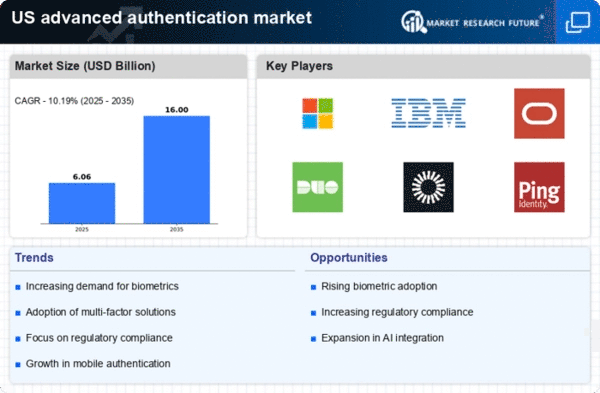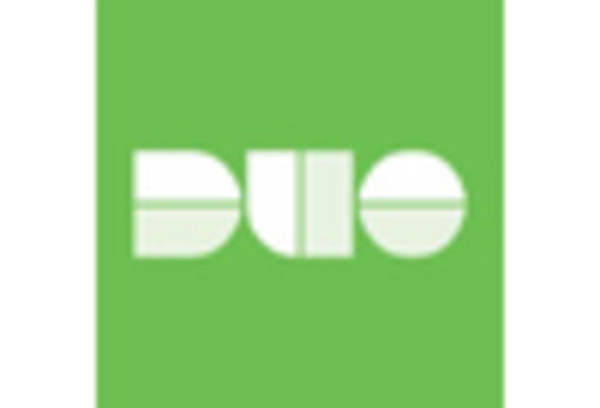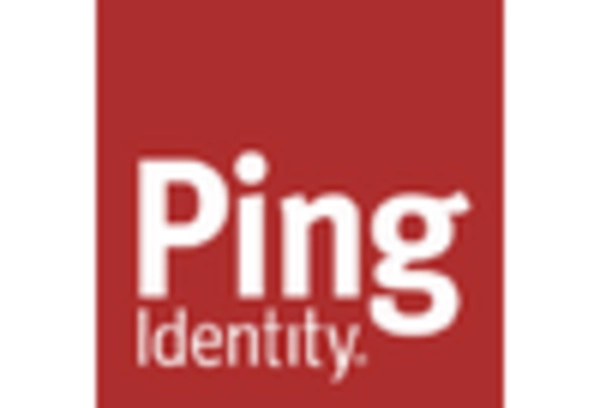Adoption of Remote Work Policies
The shift towards remote work has significantly influenced the advanced authentication market. As organizations adapt to flexible work environments, the need for secure access to corporate resources has become paramount. In 2025, it is anticipated that over 30% of the US workforce will be working remotely, necessitating the implementation of advanced authentication measures. This trend is driving the demand for solutions that ensure secure access from various locations and devices. Companies are increasingly investing in technologies such as single sign-on (SSO) and biometric authentication to facilitate secure remote access. Thus, the advanced authentication market is likely to see substantial growth as businesses prioritize security in their remote work strategies.
Increasing Cybersecurity Threats
The advanced authentication market is experiencing growth due to the escalating frequency and sophistication of cyber threats. Organizations are increasingly recognizing the necessity for robust security measures to protect sensitive data. In 2025, it is estimated that cybercrime will cost businesses globally over $10 trillion annually, prompting a shift towards advanced authentication solutions. This market is projected to expand as companies seek to mitigate risks associated with data breaches and identity theft. The demand for multi-factor authentication (MFA) and biometric solutions is likely to rise, as these technologies provide enhanced security layers. Consequently, the advanced authentication market is positioned to benefit from the urgent need for improved cybersecurity protocols.
Growing Awareness of Identity Theft Risks
The rising awareness of identity theft and its consequences is driving demand in the advanced authentication market. Consumers and businesses alike are becoming more cognizant of the vulnerabilities associated with traditional authentication methods. In 2025, it is estimated that identity theft will affect approximately 14 million individuals in the US, prompting a shift towards more secure authentication practices. Organizations are increasingly adopting advanced solutions such as biometric authentication and MFA to protect against unauthorized access. This heightened awareness is likely to fuel growth in the advanced authentication market as stakeholders prioritize security measures to safeguard personal and sensitive information.
Regulatory Pressures and Compliance Requirements
The advanced authentication market is being propelled by stringent regulatory frameworks that mandate enhanced security measures. In the US, regulations such as the Health Insurance Portability and Accountability Act (HIPAA) and the General Data Protection Regulation (GDPR) impose strict requirements on data protection. Organizations are compelled to adopt advanced authentication solutions to comply with these regulations and avoid hefty fines. The market is expected to grow as businesses seek to implement technologies that not only meet compliance standards but also enhance overall security. In 2025, it is projected that compliance-related investments will account for approximately 25% of the total spending in the advanced authentication market.
Technological Advancements in Authentication Solutions
The advanced authentication market is benefiting from rapid technological advancements that enhance the effectiveness and user experience of authentication solutions. Innovations in artificial intelligence (AI) and machine learning (ML) are enabling more sophisticated authentication methods, such as behavioral biometrics and adaptive authentication. These technologies allow for real-time risk assessment and improve the accuracy of identity verification. As organizations seek to stay ahead of cyber threats, the adoption of these advanced solutions is likely to increase. In 2025, the market for AI-driven authentication solutions is expected to grow by over 40%, indicating a strong trend towards integrating cutting-edge technology in the advanced authentication market.
















